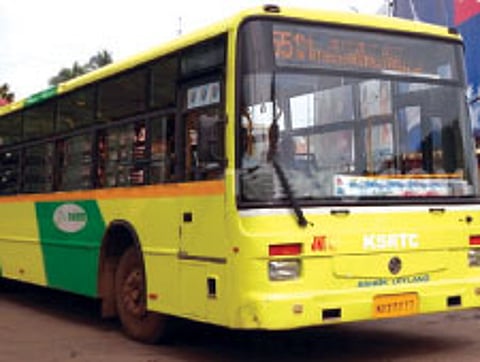Non-AC JNNURM buses 'vanishing'
The much-coveted JNNURM non-AC buses run by the Kerala State Road Transport Corporation (KSRTC) are disappearing from the city roads, thanks to the recent fuel crisis and the high cost of maintenance.
The fleet of buses introduced in the city three years ago was expected to provide a hassle-free ride for the passengers in the mofussil towns with fares close to normal services.
The buses were procured by the KSRTC from the Union Ministry of Urban Transport under the Jawaharlal Nehru National Urban Renewal Mission (JNNURM). The JNNURM service was launched in the state at Thiruvananthapuram on November 17, 2009. Initially, eight low-floor air-conditioned buses were pressed into service.
Currently, the non-AC buses under JNNURM that are conducting service in the city are under three depots, namely Peroorkada, Vikas Bhavan and Pappanamcode. Among the 14 buses in the Pappanamcode depot, only 10 conducted service on Thursday. The number of semi low-floor buses that were on schedule was 13 out of 15 in Peroorkada and 12 out of 14 in Vikas Bhavan. Five buses are off the road for months owing to the acute shortage of spare-parts. There are 30 low-floor AC buses under the City depot, of which 27 conducted service on Thursday.
The number of buses which were on the road for the past four days was further low owing to the shortage of staff, as many were on leave to celebrate Onam. The lack of sufficient conductors is another hurdle the KSRTC faces.
The maintenance cost of these vehicles is as much as 25 per cent higher than normal buses. And most of them are in need of periodical maintenance. The average mileage of the AC buses is 2.2 km per litre, while that of the non-AC buses is 3.2 km per litre; whereas, the average of a regular KSRTC bus is 4 km per litre.
Following the recent order by the Supreme Court saying oil companies were not bound to grant subsidy to KSRTC, the diesel cost would increase by Rs 17 per litre for the Corporation. The authorities also admit that this further increases the difficulty of maintaining the services, which are already not bringing any profit. But they affirm that they have not cancelled any schedules, except for a day or two.
“We have not received any official communication so far. Meanwhile, the higher authorities have made it clear that KSRTC has not cut down any schedules. The government is taking up initiatives to solve the fuel crisis. There is a shortage of conductors now, but it will be solved as soon as the new recruitment is over,” said Thiruvananthapuram City District Transport Officer M S Murali.
“It is true that the JNNURM buses are not bringing any profit. But they are not causing any loss either. The KSRTC is conducting these services owing to public interest. The additional funds required will be found by the Corporation and the government,” he added.
The collection from these services just manages the operating cost, considering aspects like depreciation, salary, fuel bill and maintenance. The minimum fare of the air-conditioned buses is Rs 15 and that of the non-air conditioned Rs 8. The KSRTC is of the view that it can make profit if the air-conditioned bus services fetch Rs 50 a km and the non-air conditioned services, Rs 38.

